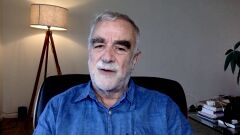Luis Moreno Ocampo
(lawyer) | ||||||||||||
|---|---|---|---|---|---|---|---|---|---|---|---|---|
 | ||||||||||||
| Born | 4 June 1952 | |||||||||||
| ||||||||||||
Luis Moreno Ocampo is an Argentine lawyer who served as the first Prosecutor of the International Criminal Court (ICC) from 2003 to 2012. Previously, he had played a major role in Argentina's democratic transition (1983–1991).
On 21 April 2003, Moreno Ocampo was unanimously elected first prosecutor at the new International Criminal Court. On 16 June 2003, as the conflict with Iraq began, he was sworn in for a non-renewable nine-year term as Chief Prosecutor of the ICC. During those nine years, the Office of the Prosecutor opened investigations in four states: the Democratic Republic of the Congo, Uganda, the Central African Republic and Kenya – and in Darfur and Libya at the request of the UN Security Council, and in Côte d'Ivoire at the request of its national authorities.
ICC prosecutions
In his capacity as the prosecutor of the court, Moreno Campo also initiated investigations in Afghanistan, the Central African Republic, Côte d'Ivoire, Darfur in Sudan, the Democratic Republic of the Congo, Kenya, Libya, Uganda, Bangladesh/Myanmar, Palestine, the Philippines, and Venezuela. Additionally, the Office of the Prosecutor conducted preliminary examinations in situations in Bolivia, Colombia, Guinea, Iraq / the United Kingdom, Nigeria, Georgia, Honduras, South Korea, Ukraine and Venezuela. Preliminary investigations were closed in Gabon; Honduras; registered vessels of Comoros, Greece, and Cambodia; South Korea; and Colombia on events since 1 July 2002. Moreno Ocampo led an investigation of leaders of the Lord's Resistance Army, who in 2005 faced ICC arrest warrants for crimes against humanity. Moreno Ocampo directed an investigation against Germain Katanga and Matthieu Ngudjolo Chui, who received arrest warrants in 2007 and 2008 for crimes against humanity in the Democratic Republic of Congo. In March 2008, according to an Argentine online news report, Moreno Ocampo claimed that FARC, the largest guerrilla group in Colombia, should face an investigation by the ICC. He began implementing preliminary tests in Colombia, which involved evaluating prosecutions of paramilitary commanders in Colombia, and interviews with victims of FARC, among others. Moreno-Ocampo claimed that FARC could be investigated for crimes against humanity. He visited Colombia in August, after which the ICC launched an investigation on the "support network for FARC rebels outside Colombia".
During his tenure at the ICC, the first trial ended with the conviction of Thomas Lubanga. Ben Ferencz, who at age 27 participated as prosecutor in the Nuremberg trials, closed the ICC prosecution at the age of 93. On 10 July 2012, Trial Chamber 1 sentenced Lubanga to 14 years in prison, from which six remand years were deducted.
In July 2008, Moreno Ocampo accused Omar al-Bashir of genocide, crimes against humanity and war crimes in Darfur. That November, he called for arrest warrants against rebels accused of killing members of an international peacekeeping force in Darfur.
The International Criminal Court sent in 2009 and 2010 two international arrest warrants against al-Bashir, who denied all charges. According to the United Nations, in 16 years of conflict from the 2003 uprising of two rebel groups in Darfur, he had caused 300,000 deaths and 2.5 million displacements.
In 2019, Al-Bashir was also sentenced to imprisonment for embezzling up to $9 billion in oil revenues. In 2020, Sudan's ruling generals finally agreed to hand Al-Bashir over to the ICC to face charges of war crimes and crimes against humanity in courts in The Hague.
Moreno Ocampo announced on 15 December 2010 six "prime suspects" – the Ocampo Six – in the Kenya post-election violence of 2007. Named as leading perpetrators where the suspended Minister of Higher Education William Ruto, Minister for Industrialisation Henry Kosgey, Deputy Prime Minister Uhuru Kenyatta, former commissioner of the Kenya Police Major General Mohammed Hussein Ali, head of public services Francis Muthaura, and journalist Joshua Arap Sang.
On 3 March 2011, Moreno Ocampo declared "there will be no impunity in Libya" as he announced an investigation of crimes against humanity committed by either Libyan security forces loyal to leader Muammar Gaddafi or the opposition to the Gaddafi government during the 2011 Libyan insurgency. On 16 May 2011, he filed a request to the ICC to issue arrest warrants against Gaddafi, his son Saif al-Islam Gaddafi and Libyan intelligence chief Abdullah Senussi, for crimes against humanity. The Court issued these on 27 June 2011. The ICC's Pre-Trial Chamber I formally terminated the case on 22 November 2011 against Muammar Gaddafi due to his death.[1]
Nine-year term over
On 15 June 2012, Luis Moreno Ocampo finished his term and was replaced by Gambian lawyer Fatou Bensouda.[2]
"Argentina, 1985"
Former Argentine prosecutor Luis Moreno Ocampo, who served as deputy prosecutor in Argentina’s "Trial of the Juntas" and later as the first prosecutor of the International Criminal Court, is portrayed in the film “Argentina, 1985” which won the Golden Globe for Best Motion Picture in a Non-English Language in January 2023. The film dramatises the efforts of Argentina’s civilian court to prosecute the country’s former military leaders for brutal crimes committed during the US-backed right-wing military dictatorship from 1976 to 1983. Ocampo spoke to Democracy Now! recently about that landmark trial, the new film and why “democracy is at risk everywhere.”[3]
References
Wikipedia is not affiliated with Wikispooks. Original page source here